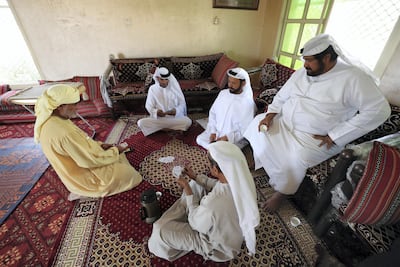Marcel Kurpershoek walked into the majlis clasping a bundle of papers covered in poetry.
He was searching for the meanings of words in poems by the renowned 17th-century bard and folk hero, Ibn Dhaher.
Mr Kurpershoek is compiling a book of Ibn Dhaher's poetry and the stories of his life for the Library of Arabic Literature and published by New York University Abu Dhabi. He will submit his manuscript in May.
But despite two years of research on the poet and decades immersed in Bedouin poetry, some words still eluded translation.
The former Dutch diplomat could not find answers in old tomes or the footnotes of poetry anthologies, nor among the scholars and poets of Abu Dhabi and Dubai.
So he came north to the emirate of Ras Al Khaimah, where Ibn Dhaher was buried and a place that claimed the poet as its own.
"Sometimes, you really have to be in a radius of 10 kilometres from the place," said Mr Kurpershoek, a senior humanities researcher at NYUAD and former diplomat for the Netherlands in Egypt, Syria and Saudi Arabia, among other countries.
“Really, location is very important. There’s no other way.”
In Ras Al Khaimah, Ibn Dhaher is a household name. He was a wily and generous trickster whose admirers journeyed to Ras Al Khaimah to hear recitations or challenge him to poetry duels. In death, his grave became a festive gathering place.
On Sunday, Mr Kurpershoek, who has a doctorate in Arabic, began his research in a small building among the red dunes of the Ras Al Khaimah camel racetrack, halfway between the oasis of Al Hail and the desert village of Al Saadi. Both were mentioned in Ibn Dhaher's stanzas.
The men at the corner table of the majlis scarcely glanced up from their cards when the white-haired Dutchman and his wife Betsy walked through the door. Others welcomed them and offered coffee.
“We’re all poets,” said Hamed Bin Saeed, one of the card players.
Finding poets in Ras Al Khaimah is scarcely a challenge. It is a question of finding the right ones.
One of the men, Matar Al Jabri, looked over pages detailing the inundation of Al Hail’s palm groves and shook his head.
“I’m from the sea and desert but these words, I don’t know them,” he said.
Mr bin Saeed offered commentary when the card game slowed as hands were dealt.
The game then paused entirely for a lively discussion on palm fertilisation techniques.
But that conversation quickly shifted into a discussion about a camel said to have won a recent race because her owner had her injected with a medicine not yet banned – and wasn't that kind of cheating?
Mr Kurpershoek navigated the discussion back to Ibn Dhaher.

Salem Obaid, a camel owner in his 70s, took hold of the papers and gave them a long hard look.
“I can’t read,” he said, and smiled.
Mr Kurpershoek pointed at a word and read it out.
“Flej. Do you know this word?” “Thelj, snow?” said Mr Obaid. “Oh yes, that’s the stuff that falls from the skies and covers everything in white. Snow.”
He said it again slowly for Mr Kurpershoek’s benefit.
“These men know more about camels than palms,” said Mr Kurpershoek, resigned.
The Kurpershoeks then made a short visit to Al Hail, a village of fragrant orchards extolled by Ibn Dhaher.
But many of its palms, which had flourished for centuries, had dried into black totems because of the depletion of local groundwater.
Mr Kurpershoek’s hopes dimmed.
“Sometimes, it is important to see what is not there,” he said. “To eliminate possibilities.”
His next stop was a government office to enlist the help of its director, who was known to love farming. There, Mr Kurpershoek received the bureaucratic response of a polite referral to a different office. He was asked to submit a formal request to meet local farmers and wait for approval from head office.
But as the director looked over the pages, he became engrossed. He opened the bottom drawer from his desk and pulled out a milky white palm stalk from a plastic bag.
“You have to eat this,” he said. “The heart of the palm.”
He split it up and shared it.
The director phoned an “old man”, who gave him the number for an older man who may be able to help.
The older man was 60.
Mr Kurpershoek, who is 70, was sceptical and said that was not old enough.
But when they asked the fisherman if he knew the meaning of the word zaema, he answered immediately: a wooden ship, neither large enough for ocean crossings nor too small. One for fishing.
Mr Kurpershoek’s questions started to flow.
Saleh Hanbalouh, a fishermen from the coastal town of Al Rams, held answers that eluded those in cities. Mr Kurpershoek arranged to meet him the next morning.
Meanwhile, the room had filled with employees dissecting interpretations of verses, palm irrigation and local libraries. The 17th-century writing had transformed the government office into a poetry majlis. Ibn Dhaher would have been pleased.


